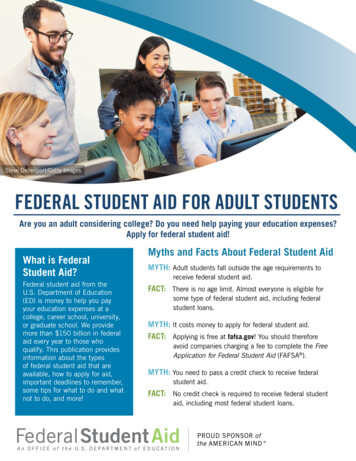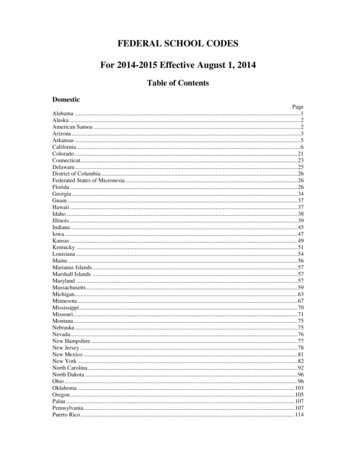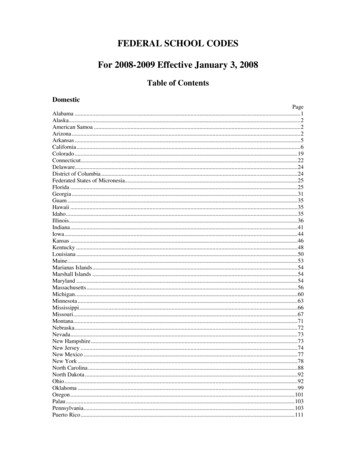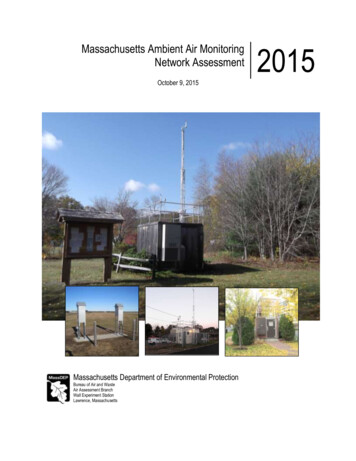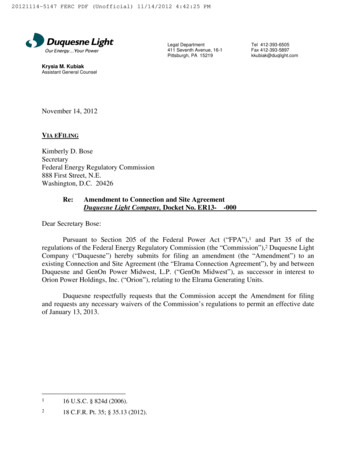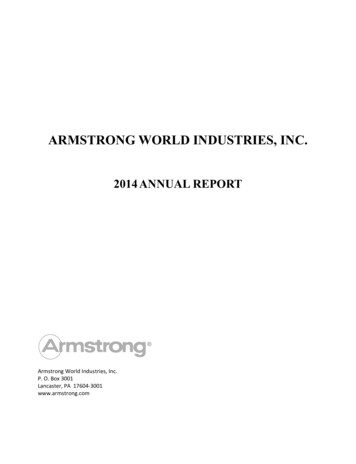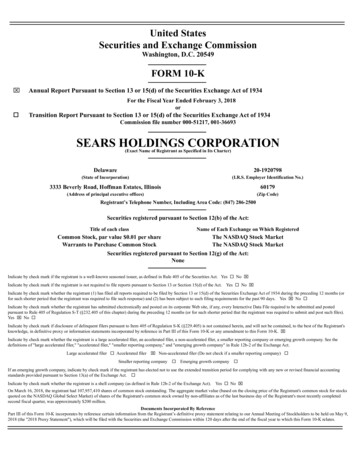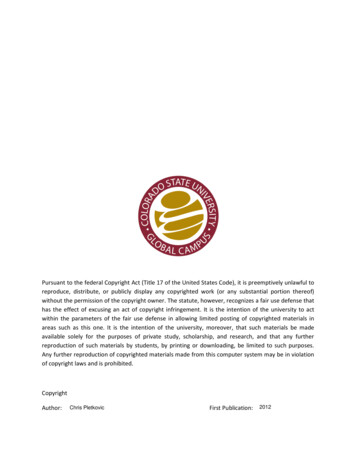
Transcription
Pursuant to the federal Copyright Act (Title 17 of the United States Code), it is preemptively unlawful toreproduce, distribute, or publicly display any copyrighted work (or any substantial portion thereof)without the permission of the copyright owner. The statute, however, recognizes a fair use defense thathas the effect of excusing an act of copyright infringement. It is the intention of the university to actwithin the parameters of the fair use defense in allowing limited posting of copyrighted materials inareas such as this one. It is the intention of the university, moreover, that such materials be madeavailable solely for the purposes of private study, scholarship, and research, and that any furtherreproduction of such materials by students, by printing or downloading, be limited to such purposes.Any further reproduction of copyrighted materials made from this computer system may be in violationof copyright laws and is prohibited.CopyrightAuthor:Chris PletkovicFirst Publication:2012
Running head: ORG 575 PORTFOLIO PROJECTORG 575 Portfolio ProjectChris PletkovicORG 575 Critical Evaluation of Research and TheoryColorado State University-Global CampusJama BradleyJune 19th, 20121
ORG 575 PORTFOLIO PROJECT2Table of ContentsChapter 1 Introduction . 3Purpose 3Problem Statement .4Audience . 4Research Design .4Summary .5Chapter 2: Literature Review . .6Introduction 6Key Terminology 6Westwood College Background 7Theoretical Framework Information .9New Federal Student Financial Aid Regulations 9Internal Auditing Models 11Summary .12References 13
ORG 575 PORTFOLIO PROJECT3Chapter 1 IntroductionWestwood College is a post-secondary educational institution that is nationally accreditedby the Accrediting Council of Independent Colleges and Schools (ACICS). As of June, 2011higher education institutions that receive federal financial aid must comply with the new federalfinancial aid regulations (Hamilton, 2011). Westwood College must meet new federal studentfinancial aid regulations to continue to accept federal financial aid and to remain competitive inthe higher education marketplace (Hamilton, 2011).PurposeThe purpose of this research study is to develop a quarterly internal auditing process thatcontinually evaluates Westwood College’s compliance with policies and procedures associatedwith the new federal aid regulations. Failure to comply with the new federal guidelines couldjeopardize the institution’s ability to accept federal financial aid from students. The three majorregulations that Westwood College must comply with are: The institution must have at least 35 % of former students repaying student loans(reducing the balance by at least 1) within the first three years of graduating (Korbe,2011). The estimated loan payment of a typical graduate must not exceed 30 % of discretionaryincome (Korbe, 2011) The estimated loan payment of an average graduate must not exceed 12 % of totalearnings (Korbe, 2011).Policies, procedures, training can coupled with periodic audits can assist the leadership andemployees at Westwood College in understanding the importance of an integrated approach to
ORG 575 PORTFOLIO PROJECTcompliance that enables effective and efficient use of resources, prevents undesirable outcomes,and achieves business objectives (Ramussen, 2011).Problem StatementFor Westwood College to remain competitive in the higher education industry theorganization must meet and comply with new federal student financial aid regulations so that itmay award federal financial aid and allow the institution to remain competitive. The intent ofthe research effort is to find and review auditing processes associated with federal financial aidrequirements. Auditing processes found will be evaluated in terms of effectiveness and fit forWestwood College in its effort to remain fully compliant with new student financial aidregulations. Results of the evaluation will be used to inform and development of an appropriateauditing process for Westwood College.Audience for the Research EffortThe audience that will benefit most from the research effort is Westwood Collegeleadership, Westwood College employees and other organizations interested in remainingeligible for federal student financial aid. The research will help set a benchmark and provideguidance for compliance audits within and throughout the higher education industry. Thespecific areas of study are: new student financial aid regulations, internal compliance auditmodels, current and past industry regulatory problems or issues that may have occurred withinFor-Profit education.Research DesignThe research design chosen for this study is a mixed method research design. A mixedmethod research design is a set of procedures for collecting, analyzing and mixing bothquantitative and qualitative methods in a study to understand a research problem (Clark &4
ORG 575 PORTFOLIO PROJECT5Creswell, 2010). The theoretical framework used in this research study is organizationallearning theory. A learning organization proactively promotes, facilitates, documents, andrewards the creation, collective, sharing, and management of knowledge. Organizationalknowledge theorist study how organizations learn, use, and retain knowledge. Activitiesassociated with knowledge management include research, project plans, lessons learned,succession planning, and data management (Mind Tools, 2012).SummaryWestwood College must meet new federal student financial aid regulations to continue toaccept federal financial aid and to remain competitive in the higher education marketplace. Forcompliance to occur at Westwood College policies, procedures and an internal audit model mustbe implemented. Quarterly audits will assist the leadership team and employees at WestwoodCollege in understanding the importance of an integrated approach to compliance that enableseffective and efficient use of resources, prevents undesirable outcomes, and achieves businessobjectives (Ramussen, 2011).
ORG 575 PORTFOLIO PROJECT6Chapter 2: Literature ReviewChapter 2 provides background information on Westwood College; explains the newfederal student financial aid regulations; reviews the theoretical framework that serves as a lensfor the project; and presents general auditing processes and mandates. The purpose of thisresearch study is to develop a quarterly internal auditing process that periodically evaluatesWestwood College’s policies and procedures associated with the new federal aid regulations.Failure to comply with the new federal guidelines could jeopardize the institutions ability toaccept federal financial aid from students.Key TerminologyCompliance Audits: A compliance audit is a comprehensive review of an organization'sadherence to regulatory guidelines. Independent consultants evaluate the strength andthoroughness of compliance preparations and auditors review security polices, user accesscontrols and risk management procedures over the course of a compliance audit (Rouse, 2010)Organizational Learning: is characterized by total employee involvement in a process ofcollaboratively conducted, collectively accountable change directed towards shared values orprinciples (Watkins & Marsick 1993).New Federal Aid Regulations: To remain in compliance with new regulations, the federalgovernment now requires all institutions to disclose total program costs, loan repayment rates,graduates' debt-to-earnings ratio and other critical consumer information to help students betterchoose the gainful employment program that's right for them (Hamilton, 2011).Westwood College Background
ORG 575 PORTFOLIO PROJECT7Westwood College is an institution of higher learning founded in Denver, Colorado in1953. Today, Westwood has 14 campuses across California, Colorado, Georgia, Illinois andVirginia and an online campus (Westwood, 2012). Westwood offers a unique hands-on, careerfocused curriculum providing three-year bachelor’s degrees in high-growth fields. Westwoodhas more than 13,000 students enrolled in degree programs in business, design, technology,industrial services, justice and healthcare (Westwood, 2012). To date, over 24,000 Westwoodgraduates have transformed their lives by obtaining the skills, tools, experience and connectionsnecessary to achieve meaningful careers (Westwood, 2012).As of June, 2011, higher education institutions that receive federal financial aid mustcomply with the new federal financial aid regulations (Hamilton, 2011). Westwood Collegemust meet new federal student financial aid regulations to continue to accept federal financial aidand to remain competitive in the higher education marketplace (Hamilton, 2011). The threemajor regulations that Westwood College must comply with are as follows; The institution musthave at least 35 % of former students repaying student loans (reducing the balance by at least 1)within the first three years of graduating-the estimated loan payment of a typical graduate mustnot exceed 30 % of discretionary income; and the estimated loan payment of an average graduatemust not exceed 12 % of total earnings (Korbe, 2011). Periodic audit, policies, procedures, andtraining can assist the leadership and employees at Westwood College in understanding theimportance of an integrated approach to compliance that enables effective and efficient use ofresources, prevents undesirable outcomes, and achieves business objectives (Ramussen, 2011).Research Problem and Evidence of ImportanceFor Westwood College to remain competitive in the higher educaton industry the organizationmust meet and comply with new federal student financial aid regulations so that it may award
ORG 575 PORTFOLIO PROJECT8federal financial aid and allow the institution to remain competitive. To remain in compliancewith new regulations, the federal government now requires all institutions to disclose totalprogram costs, loan repayment rates, graduates' debt-to-earnings ratio, and other criticalconsumer information to help students better choose the gainful employment program that isright for them (Hamilton, 2011). The first time an institution’s program fails to meet the debtmeasure, the institution must disclose to students why the measurement was missed and how theissue will be addressed (Hamilton, 2011). After missing the debt measure for a second time in 3years, higher education institutions must inform students that their debts may be unaffordableafter graduation, that the program is at risk of losing eligibility to participate in Federal studentaid programs, and existing transfer options (Hamilton, 2011). After a third failure in 4 years tomeet the debt measure, the institution’s program is no longer eligible to participate in Federalstudent aid programs and cannot reapply for eligibility for at least 3 years. Under this federalmandated framework, the first year a program could become ineligible would be 2015, based onits performance in FY 2012-2014 (Hamilton, 2011).Theoretical FrameworkThe theoretical framework used to inform the research study is organizational learningtheory. Organizational learning and knowledge are characterized by total employee involvementin a process of collaboratively conducted, collectively accountable change directed towardsshared values or principles (Watkins & Marsick 1993). A learning organization proactivelypromotes, facilitates, documents, and rewards the creation, collective, sharing, and managementof knowledge. Organizational knowledge theorist study how organizations learn, use, and retainknowledge. Activities associated with knowledge management include research, project plans,lessons learned, succession planning, and data management (Mind Tools, 2012).
ORG 575 PORTFOLIO PROJECT9New Federal Financial Aid RegulationsThe federal financial aid rules reflect the principles outlined in the President Obama’srecent Executive Order on improving regulations, provide students and consumers with theinformation they need to make good educational choices, and give failing programs ampleopportunity to make needed improvements (Hamilton, 2011). Institutions will now be requiredto disclose total program costs, loan repayment rates, graduates' debt-to-earnings ratio, and othercritical consumer information to help students better choose the gainful employment programthat is right for them. And poor performing programs must fail the debt measures three times in a4 year period before losing eligibility to participate in Federal student aid programs, rather thanlosing eligibility immediately (Hamilton, 2011).These regulations are designed to ramp up over the next 4 years, giving colleges time toreform while protecting students and their families from exploitative programs (Hamilton, 2011).These new regulations will help ensure that students at these schools are getting what they payfor: solid preparation for a good job. To qualify for Federal aid, the law requires that most forprofit programs and certificate programs at nonprofit and public institutions prepare students forgainful employment in a recognized occupation (Hamilton, 2011).Under the federal financial aid regulations introduced, a program would be considered tolead to gainful employment if it meets at least one of the following three metrics: at least 35 % offormer students are repaying their loans (defined as reducing the loan balance by at least 1); theestimated annual loan payment of a typical graduate does not exceed 30 % of his or herdiscretionary income; or the estimated annual loan payment of a typical graduate does not exceed12 % of his or her total earnings. While the regulations apply to occupational training programs
ORG 575 PORTFOLIO PROJECT10at all types of institutions, for-profit programs are most likely to leave their students withunaffordable debts and poor employment prospects (Hamilton, 2011).Students at for-profit institutions represent 12 % of all higher education students, 26 % ofall student loans and 46 % of all student loan dollars in default. The median Federal student loandebt carried by students earning associate degrees at for-profit institutions was 14,000, whilethe majority of students at community colleges do not borrow (Hamilton, 2011). More than aquarter of for-profit institutions receive 80 % of their revenues from taxpayer-financed Federalstudent aid. These problems and wide-spread evidence of waste, fraud and abuse prompted theObama administration to embark on an 18-month negotiation with the higher educationcommunity over new regulations (Hamilton, 2011). During the negotiation, the Departmentworked with stakeholders to develop a set of proposals around 14 specific issues designed tostrengthen the integrity of the Federal student aid program and ensure that taxpayer funds areused appropriately (Hamilton, 2011).With the emphasis on program improvement under the final regulation, the Departmentestimates that fewer programs will ultimately lose eligibility for participation in Federal studentaid programs than under the original proposal (Hamilton, 2011). Failure rates at for-profitprograms are expected to be somewhat higher than for other institutions under the finalregulation. The Department estimates that 18 % of for-profit programs are expected to fail thethresholds at some point, with 5 % of them failing to improve and ultimately losing eligibility(Hamilton, 2011). Among programs at all institutions, approximately 8 % may fail the thresholdsat some point, with only 2 % of them failing to improve and losing Federal student aid eligibility(Hamilton, 2011)Internal Audits
ORG 575 PORTFOLIO PROJECT11During the research study the following internal auditing models will be utilized to ensurethat the auditing process recommended for Westwood College incorporated all aspects of theinstitution from a business accounting perspective. Departmental Audits: Departmental audits are designed to review and evaluate theactivities and operations of a particular College function, activity, department, or unitunder review. Departmental audits will evaluate accounting controls, ensure compliancewith College policies and procedures, applicable laws and regulations, and validate therecords and account balances of the auditor. Departmental audits will utilize a completebattery of audit tests and procedures, including, but not limited to, functional tests,transaction reviews, substantive tests, and analytical reviews (Khan, 2010). Operational Audits: Operational audits are designed to evaluate procedures and controlswhich impact the attainment of the College's organizational goals and objectives.Operational audits also measure compliance with College policies and procedures as wellas applicable laws and regulations. During operational audits, functional tests andtransaction reviews will be utilized (Khan, 2010). Follow-up Audits: Follow-up audits are designed to determine whether corrective actionhas been taken on previous audit recommendations. These audits are usually conductedsix months after the Final Audit Report was issued and usually include only thedeficiencies reported in the Final Audit Report. The follow-up audit shall include suchfunctional or substantive tests that are necessary to verify that necessary and appropriatecorrective actions have been taken (Khan, 2010).Summary
ORG 575 PORTFOLIO PROJECT12The research study will help Westwood College develop a quarterly internal auditingprocess that continually evaluates the institutions policies and procedures associated with thenew federal aid regulations. Failure to comply with the new federal guidelines could jeopardizethe institutions ability to accept federal financial aid from students. The auditing processesdiscussed throughout the research study provide an effective model to evaluate WestwoodCollege in its effort to remain fully compliant with new student financial aid regulations in thefuture. Implementation of the organizational learning theory will proactively promote, facilitate,document, and rewards the creation, collective, sharing, and management of knowledge.Organizational knowledge will help Westwood College’s leadership team and employees learn,use, and retain knowledge. Activities associated with knowledge management will includeresearch, project plans, lessons learned, succession planning, and data management to ensurecompliance with the new student federal financial aid regulations (Mind Tools, 2012).
ORG 575 PORTFOLIO PROJECT13ReferencesClark, V.L.P., & Creswell, J.W. (2010). Understanding research: A consumer’s guide.Needham Heights, MA: Allyn & Bacon.Hamilton, J. (2011). Obama administration announces new steps to protect students fromineffective career college programs. Retrieved from yment-regulationsKhan, M. (2010). Wak Model-The way of best solution for an organization internal auditProcess. Retrieved from Korbe, T. (2011). The for-profit college fight. Retrieved xpected-still-unfair/Mind Tools. (2012). How good are your management skills. Retrieved /frameset.jsp?tab tab group id 4 1&url e%3DCourse%26id%3D 94061 1%26url%3DRasmussen, M. (2011). Corporate integri
Westwood College is an institution of higher learning founded in Denver, Colorado in 1953. Today, Westwood has 14 campuses across California, Colorado, Georgia, Illinois and Virginia and an online campus (Westwood, 2012). Westwood offers a unique hands-on, career-focused curriculum provi



